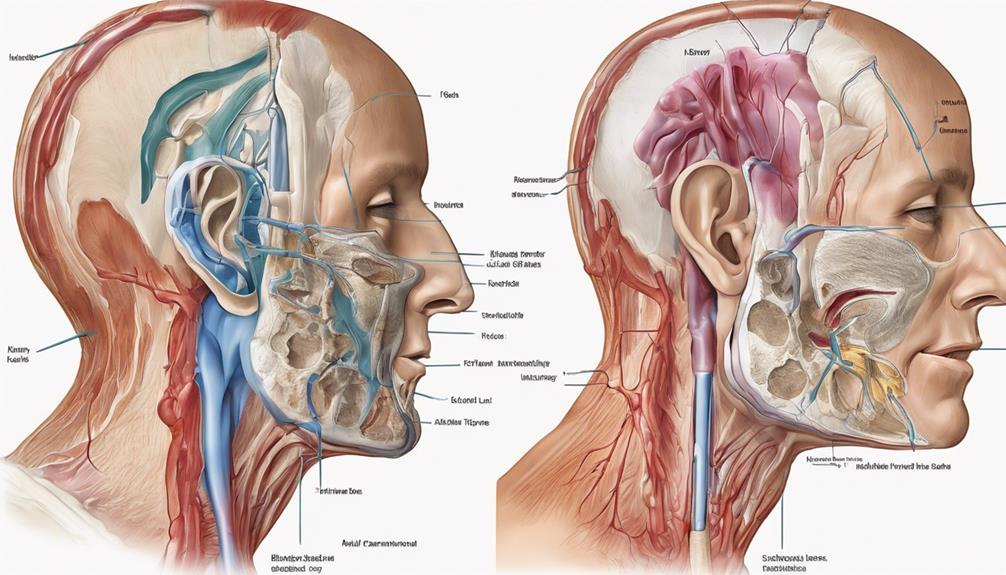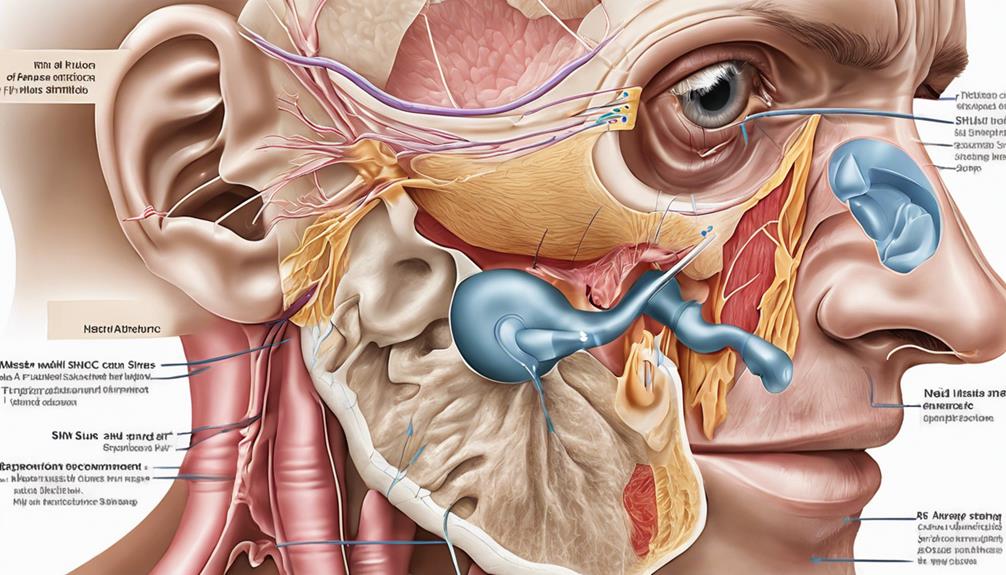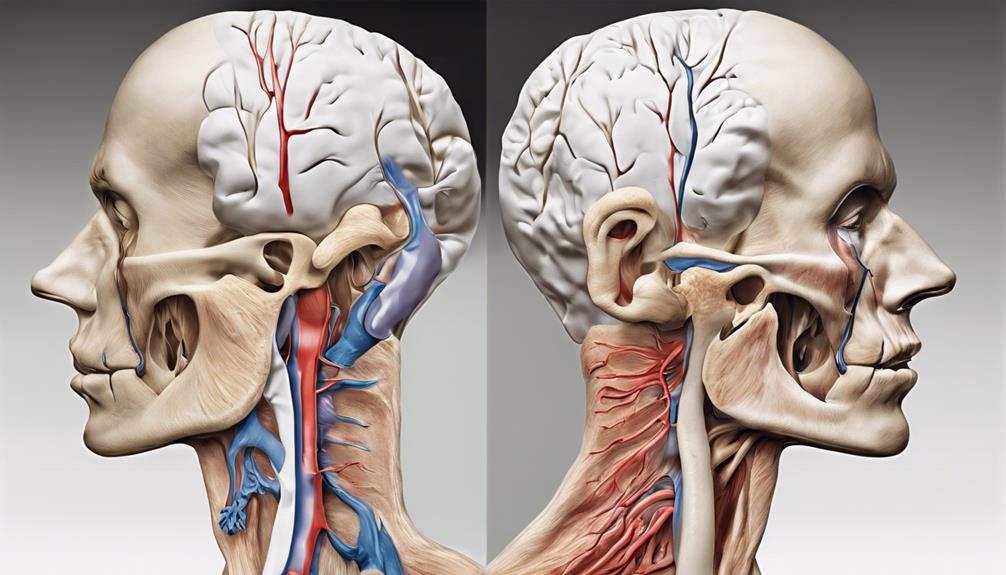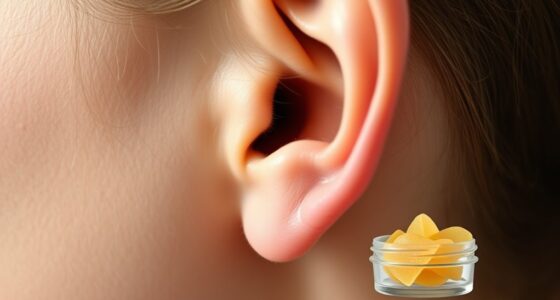Have you ever questioned how a seemingly harmless sinus infection could quietly impact your hearing?
The connection between sinus issues and hearing loss might surprise you. From muffled sounds to potential permanent impairment, the impact of sinus infections on our ears is not to be underestimated.
But fear not, as we uncover the intricate relationship between sinusitis and hearing loss, shedding light on causes, symptoms, treatments, and prevention strategies that can help safeguard your precious sense of hearing.
Key Takeaways
- Sinus infections can lead to hearing impairment through Eustachian tube and middle ear mechanisms.
- Swelling in sinuses causes pressure imbalances affecting hearing, leading to symptoms like ear pressure and muffled sounds.
- Fluid buildup in the ear from prolonged sinus infections can contribute to potential long-term hearing issues.
- Eustachian tube blockage and middle ear fluid buildup are common causes of sinus-related hearing impairment.
Understanding Sinus Infections and Hearing Loss
Understanding the intricate relationship between sinus infections and hearing loss is essential for recognizing the potential impact on our auditory health. Sinus infections, particularly chronic sinusitis, can lead to hearing impairment through various mechanisms involving the Eustachian tube and middle ear. When sinuses swell, it can create pressure imbalances that affect our hearing abilities, causing symptoms like ear pressure and muffled sounds. If left untreated, prolonged sinus infections can result in fluid buildup in the ear, further contributing to potential long-term hearing issues.
Fortunately, there are treatment options available to address sinus infections and mitigate their impact on hearing. Medications, decongestants, and saline sprays can help alleviate sinus symptoms and prevent associated hearing loss. For individuals with chronic sinusitis, balloon sinuplasty is a viable option to relieve sinus pressure, potentially improving hearing outcomes. By understanding how sinus infections can affect our ears and exploring appropriate treatment avenues, we can better protect our auditory health and overall well-being.
Causes of Sinus-Related Hearing Impairment

When sinuses become inflamed due to infection, various factors can contribute to hearing impairment, highlighting the intricate relationship between sinus issues and auditory health. Sinus-related hearing impairment can stem from a variety of causes, each impacting hearing in its unique way:
- Eustachian Tube Blockage: Swollen sinuses can lead to the blockage of the Eustachian tube, which is responsible for regulating pressure in the middle ear. This blockage can result in temporary hearing loss as the pressure changes affect the ear's ability to transmit sound effectively.
- Fluid Buildup in the Middle Ear: Sinus infections may cause fluid buildup in the middle ear, disrupting the normal function of the ear and affecting the ability to hear clearly. The presence of fluid can muffle sounds and distort the reception of auditory signals.
- Impact on Cochlear Function: Chronic sinusitis can contribute to sensorineural hearing loss by affecting cochlear function. Inflammation in the sinuses can indirectly impact the cochlea, the auditory organ responsible for converting sound vibrations into electrical signals for the brain to interpret.
Symptoms of Hearing Loss Due to Sinusitis
Symptoms of hearing loss attributed to sinusitis can present as ear pain, pressure, and a sensation of fullness in the ear. This occurs because sinusitis can cause inflammation in the nasal passages, leading to Eustachian tube dysfunction. When the Eustachian tubes are affected, they may fail to regulate pressure in the middle ear properly, resulting in symptoms of hearing loss. Additionally, sinusitis can cause fatigue due to the body's immune response to the infection, further impacting one's overall well-being.
In some cases, fluid accumulation in the inner ear due to sinusitis can further exacerbate hearing problems. Individuals experiencing sinusitis-related ear symptoms like hearing loss may also notice muffled sounds or difficulty hearing certain frequencies. It's essential to monitor these symptoms as they may fluctuate in intensity based on the severity of the sinus infection. Furthermore, accompanying signs such as tinnitus (ringing in the ears) and dizziness can also indicate sinusitis-related hearing issues.
If you suspect sinusitis is affecting your hearing, seek medical attention for proper evaluation and treatment.
Treatment Options for Sinus-Induced Hearing Loss

Experiencing hearing loss due to sinusitis can be concerning, but there are effective treatment options available to address this issue and improve your overall quality of life.
When it comes to treating sinus-induced hearing loss, several options can help alleviate symptoms and improve your hearing:
- Medications: Utilizing medications to reduce inflammation and congestion in the sinuses can help improve Eustachian tube function, ultimately benefiting your hearing health.
- Balloon Sinuplasty: This minimally invasive procedure can be a game-changer in managing chronic sinusitis, potentially leading to an improvement in associated hearing loss.
- Saline Nasal Sprays and Decongestants: These over-the-counter remedies can aid in reducing sinus pressure and congestion, which in turn can positively impact Eustachian tube function and alleviate hearing issues.
Preventing Hearing Complications From Sinus Infections
Prompt treatment of sinus infections is crucial in preventing potential complications that may affect hearing health. When sinusitis causes Eustachian tube blockage, it can lead to temporary hearing loss. However, if left untreated, chronic sinus infections may result in long-term or permanent hearing impairment. To prevent such hearing complications, considering options like balloon sinuplasty for severe sinus issues can be beneficial. This procedure can help alleviate sinus blockages and reduce the risk of hearing problems associated with sinus infections. By effectively managing sinus infections, not only can overall ear health improve, but the chances of experiencing hearing-related issues can also be minimized. Taking proactive steps to address sinusitis promptly is key to safeguarding your hearing abilities and preventing any potential long-lasting consequences on your auditory health.
| Preventing Hearing Complications | From Sinus Infections |
|---|---|
| Prompt Treatment is Crucial | Balloon Sinuplasty Option |
| Eustachian Tube Blockage Risks | Chronic Sinus Infections Impact |
| Temporary Hearing Loss | Long-term Hearing Impairment |
| Effective Sinus Infection Management | Overall Ear Health Improvement |
| Preventing Potential Hearing Issues | Safeguarding Auditory Health |
Frequently Asked Questions
How Long Does It Take to Fully Recover From Sinusitis?
We've got you covered! Recovery time from sinusitis varies depending on the infection's type and severity. Acute sinusitis typically clears up in 1-2 weeks with proper treatment, while chronic cases may linger for several weeks to months.
Timely medical intervention can speed up the healing process. Rest, hydration, and following prescribed medications are crucial for a swift recovery. Persistent symptoms might require ongoing management and follow-up with a healthcare provider.
How Do You Unclog Your Ears From Congestion?
When our ears are clogged due to congestion, there are several effective methods to help clear them.
The Valsalva maneuver, chewing gum, swallowing, warm compresses, nasal decongestants, saline sprays, yawning, and jaw movements can all assist in equalizing pressure and opening up the Eustachian tubes.
These simple techniques can provide relief and improve hearing by addressing congestion-related blockages in the ears.
What if a Sinus Infection Won't Clear up With Antibiotics?
If a sinus infection won't clear up with antibiotics, it could be due to antibiotic resistance or a fungal sinus infection. In such cases, antifungal medications or even sinus surgery might be necessary.
Seeking guidance from an ENT specialist can help determine the best course of action. Allergy testing and immunotherapy may also be recommended to address underlying causes.
It's essential to explore all options to find the most effective treatment for persistent sinus infections.
How Can I Get My Hearing Back From Sinuses?
We can help you regain your hearing lost due to sinus issues. Seeking prompt medical attention is crucial. Medications, decongestants, and saline sprays can aid in alleviating symptoms affecting hearing.
For chronic cases, balloon sinuplasty might be recommended. Early and effective management of sinus infections can prevent long-term complications like permanent hearing loss.
Consulting an ENT specialist for personalized treatment plans is key to restoring your hearing impacted by sinus problems.
Can Using Rude Phrases When Speaking to Someone with Hearing Loss Cause Sinus Infections?
When speaking to someone with hearing loss, using rude phrases can be disrespectful and harmful. Instead, use tips for respectful communication to ensure clear and kind interaction. Additionally, sinus infections are caused by viruses or bacteria, not by the nature of speech.
Conclusion
In the end, it's ironic how something as common as a sinus infection can lead to temporary or even permanent hearing loss.
By taking care of our sinuses and seeking prompt treatment, we can prevent potential complications that affect our ability to hear.
Remember, what starts as a simple cold can sometimes end up impacting our hearing in ways we never expected.
Stay vigilant, and don't underestimate the connection between sinus health and our precious sense of hearing.











